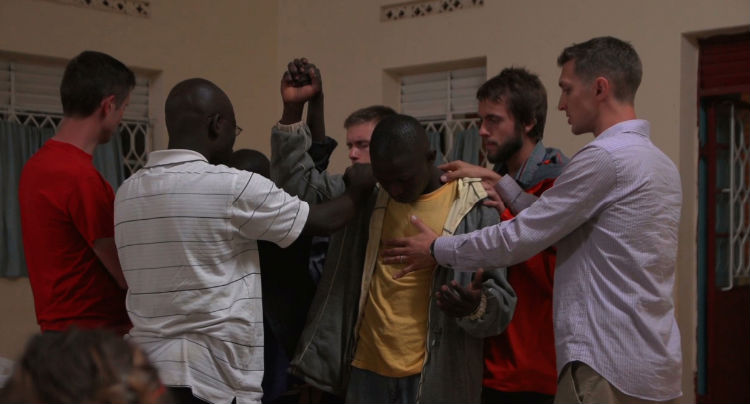
Uganda is in desperate need of moral realignment, God Loves Uganda provides a critical voice of clarity.

Uganda is in desperate need of moral realignment, God Loves Uganda provides a critical voice of clarity.
In the most infuriating, jaw-dropping piece of footage in Roger Ross Williams’ polemical documentary, God Loves Uganda, members of the Ugandan parliament are gathered in a room, cheering and chanting, elatedly rejoicing for the first reading of a newly submitted bill. The bill is called the “Uganda Anti-Homosexuality bill” (also widely referred to as the “Kill the Gays bill”), which would criminalize homosexual acts and relationships, as well as make the offenses punishable by death.
The bill has been met with harsh criticism from Western governments and countries worldwide. One might assume that the extremist sentiments at the root of the bill stems from a backwards morality of one of the poorest countries in the world, whose median age is 15, a longterm result of the fall of Idi Amin. Truth is, this hateful anti-gay mentality came in the wake of Amin’s overthrowing, straight out of Christian Middle America, delivered by evangelicals like the members of IHOP (the International House of Prayer), who saw Uganda–impoverished, on the mend and reeling from war–as the perfect country to seize and infuse with their ideals, including homophobia.
Williams’ eye-opening doc reveals the truth about the origins of the Ugandan anti-gay movement and the army of American evangelicals who imported it. It illustrates just how terrifying an environment Uganda is right now for its LGBT community through interviews with people on both sides of the issue (opposers of the bill are woefully outnumbered.) Archival footage of murdered Ugandan LGBT activist (and first “out” Ugandan) David Kato soberingly illustrates the direness of the socio-political climate, with Kato explaining the danger of the Ugandan people taking the law into their own hands. His assassination speaks to this doctrine.
The film’s (and sadly, Uganda’s) sole glimmer of hope, now that Kato is gone, is former bishop Christopher Senyojo, who was excommunicated from the church when he refused to condemn the LGBT community. Just as Kato’s was, Senyonjo’s life is in constant peril, though he gallantly continues to hold mass separate from the church, which is open to all Ugandan citizens, regardless of sexual preference. Williams takes time to let Senyonjo delve into his moving personal history, filming the bishop walking around the abandoned home from his childhood (a powerful image.)
Though Williams plays fair in that he gives those in support of the bill a chance to speak on camera, but the film is far from a model of objectivity, as he’s clearly devoted to the eradication of all anti-gay sentiment in the country (who could blame him?) Still, Williams exercises restraint; there isn’t any overtly manipulative editing going on here, as some of the film’s subjects–like anti-gay activist Scott Lively, who’s asserted to thousands of Ugandans (to great success) that gays are the inventors of Nazism–need no filmic finessing to help communicate their absurdity. It’s horrifying and utterly embarrassing that Lively is viewed as an authority on theology and a representative of America in Uganda.
It’s not shown in the film, but many missionaries do some good work in Uganda, providing aid to a desperate country that needs it. Still, perhaps unbeknownst to some of them, they’re part of a larger plan to transplant warped conservative ideals that are dwindling on U.S. soil to “The Pearl of Africa”, where that nation’s identity is still developing and impressionable. When Williams asks a young American missionary couple (who predominantly work to educate Ugandan children) what their stance is on the Anti-Gay bill, they play dumb, feigning complete ignorance of the “Kill the Gays” bill’s lethal implications. Their charade is deeply disturbing. Uganda is in desperate need of moral realignment, and God Loves Uganda provides a critical voice of clarity.